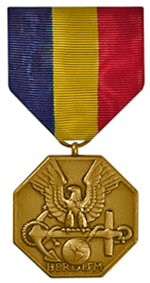Navy and Marine Corps Medal
| Navy and Marine Corps Medal | |
|---|---|
 | |
| Type | Personal military decoration |
| Awarded for | "Distinguishing oneself by heroism not involving actual conflict with an enemy of the United States" |
| Presented by | the United States Department of the Navy[1] |
| Established | 7 August 1942 Retroactive to 6 December 1941 |
| First awarded | World War II |
| Precedence | |
| Next (higher) | Distinguished Flying Cross |
| Equivalent | Army: Soldier's Medal Air and Space Forces: Airman's Medal Coast Guard: Coast Guard Medal |
| Next (lower) | Bronze Star Medal |
The Navy and Marine Corps Medal is the highest non-combat decoration awarded for heroism by the United States Department of the Navy to members of the United States Navy and United States Marine Corps. The medal was established by an act of Congress on 7 August 1942, and is authorized under 10 U.S.C. § 6246.
The Navy and Marine Corps Medal is the equivalent of the Army's Soldier's Medal, Air and Space Forces' Airman's Medal, and the Coast Guard Medal.
Criteria
As the senior non-combat award for heroism, this award hinges on the actual level of personal "life threatening" risk experienced by the awardee. For heroic performance to rise to this level it must be clearly established that the act involved very specific life-threatening risk to the awardee.[2]
During the mid-20th century, the Navy and Marine Corps Medal has been awarded instead of the Silver or Gold Lifesaving Medal, for sea rescues involving risk to life. This is due primarily to the creation of a variety of additional military decorations that are often considered more prestigious than the Lifesaving Medal.[3]
Additional awards of the medal are denoted by gold or silver 5⁄16 inch stars.[2]
The Navy and Marine Corps Medal was first bestowed during World War II.
Appearance
The Navy and Marine Corps Medal is an octagonal bronze medal. The obverse depicts an eagle holding a fouled anchor over a globe. The word Heroism is inscribed below the globe.[3] The ribbon of the medal is three equal stripes of navy blue, old gold, and apple red.[4]
Notable recipients
- John F. Kennedy, USN – President of the United States who was awarded the medal as commanding officer of Motor Torpedo Boat PT-109 during World War II.[5]
- James E. Williams, USN, Medal of Honor recipient, Vietnam War
- Britt K. Slabinski, USN, Medal of Honor recipient, Navy SEAL
- Carl Brashear, USN, Navy Master Diver
- Don Shipley, USN, Former Navy SEAL and Stolen valor activist
- Charles Jackson French, USN, Mess Attendant 2nd Class
See also
References
- ^ "Archived copy" (PDF). Archived from the original (PDF) on 2010-09-18. Retrieved 2018-11-28.
{{cite web}}: CS1 maint: archived copy as title (link) - ^ a b "Navy and Marine Corps Award Manual" (PDF). SECNAV INSTRUCTION 1650.1H. United States Navy. 22 August 2006. pp. 2–25. Retrieved 6 February 2013.
- ^ a b "Navy and Marine Corps Medal (NM)". Awards.navy.mil. Chief of Naval Operations. Archived from the original on 2014-06-27. Retrieved 6 February 2013.
- ^ "MIL-DTL-11589/106E Ribbon, U.S. Navy and U.S. Marine Corps Medal". Assistdocs.com. US Department of Defense. Retrieved 6 February 2013.
- ^ "Lt. John F. Kennedy's NMCM citation". Naval History and Heritage Command. Retrieved 6 February 2013.
